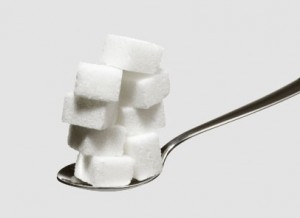 By Dianne Piepenburg, MS, RD, CSO, LD – Minnesota Oncology
By Dianne Piepenburg, MS, RD, CSO, LD – Minnesota Oncology
So many people have read it, so many people have heard it. To those diagnosed with cancer, the information seems scary and intimidating – “Sugar Feeds Cancer!” But, does it really?
It is important to understand first where this theory comes from. If one were to look at both cancerous and non-cancerous cells under a microscope, they would see that both use available sugar for energy. However, when people think of sugar, they often think of the refined sugars that are commonplace in our food supply, including table sugar, honey, brown sugar, etc. What the information on the internet and books often does not explain is that the cell is using carbohydrate which has been turned into glucose for energy. [sugar]
While it is true that refined sugars are used for energy by cancerous and non-cancerous cells, many “healthy” foods also contain carbohydrates including fruits, vegetables, whole grains, dairy products, beans, etc. Does this mean one needs to avoid all sources of glucose and rely on eating only protein and fat? No. Here is why:
- What much of the available literature fails to explain is that while cancer cells use glucose for energy, so do all cells in our body because humans need it to survive.
- The body cannot tell if the available glucose is coming from a candy bar or a piece of fruit. It is going to use the glucose the same. However, when glucose comes from fruits, vegetables, etc. which contain fiber, it takes longer to be digested and absorbed into the bloodstream. This also happens when carbohydrates are eaten with protein and fat. This results in the body needing less insulin.
- Insulin is part of a complex set of systems that is involved in cell growth. Normal healthy cells grow, divide, and die as part of the normal process of living. Cancer cells, on the other hand, lose the “checks and balances” that normal cells have, and too much insulin may encourage cancer cells to grow more, which is something not desired.
- If one were to restrict, or eliminate, carbohydrate from their diet, the body will use its own reserves from protein and fat to make glucose. Neither of these are preferred sources of energy. In fact, glucose is the only source of fuel for the brain. General recommendations for a healthy carbohydrate intake are 45-60 grams of carbohydrate per meal, which equals 3-4 servings of carbohydrates.
- Finally, let’s talk about PET (positron emission tomography) scans. People may have been told that the “sugar,” in the radioactive tracer used for this test “goes right to the cancer.” All tissues in your body absorb some of this tracer, but tissues that are using more energy — including cancer cells — absorb greater amounts. This radioactive glucose is also not something that would be ingested and is not the same as eating a carbohydrate-containing food.
So, as you can see, the theory that sugar feeds cancer is not helpful. Sugar is needed in order to survive, but a lot of it can cause the body to make too much insulin, which is also not healthy.
Being afflicted with cancer can bring with it numerous challenges, including eating. While it is desired to eat a plant-based diet full of cancer-fighting foods, sometimes those types of foods are not tolerable. If this does occur, liberalize the diet and include any and all foods during difficult times. When feeling better, re-incorporate a plant-based diet that uses more whole foods and less processed foods including fruits, vegetables, whole grains, beans, nuts, etc. The occasional dessert or treat is fine, but eat them in moderation. After all, life is meant to be enjoyed, so let food be a part of it!
- Shils ME, Shike M, Ross CA, Caballero B, Cousins R. Modern Nutrition in Health and Disease. 10th ed. Baltimore: Lippincott Williams & Wilkins; 2006.
- American Institute for Cancer Research. http://www.aicr.org/patients-survivors/cancerresource/cancerresource-faqs.html. Accessed January 10, 2014.
- Mayo Clinic. http://www.mayoclinic.org/diseases-conditions/cancer/in-depth/cancer-causes/ART-20044714?pg=2. Accessed January 10, 2014.



